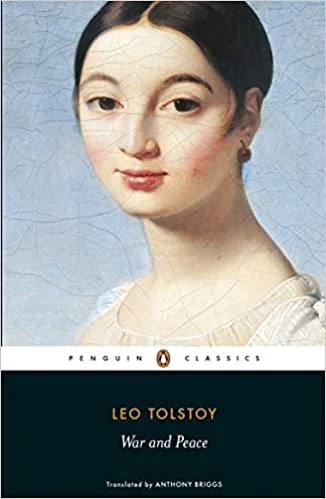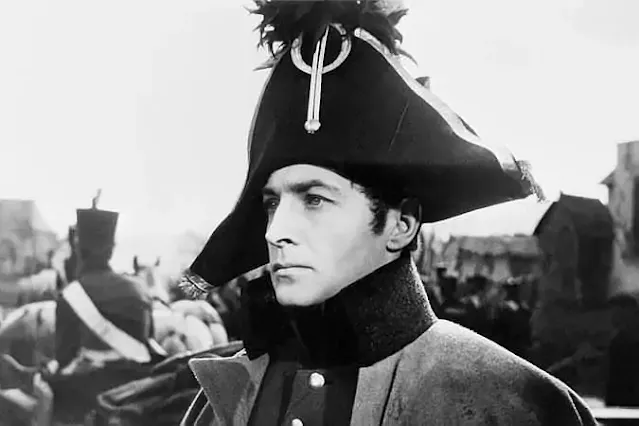 |
| Andrei Paulkansky |
This famous Russian-French War was also proudly called the "Patriotic War" by the Russians. Half a century later, Leo Tolstoy spent six years with this battle as the background to write a million-character masterpiece "War and Peace", which was praised by countless people as "the greatest in world literature." work".
Tolstoy said frankly that he originally planned to write only a few stories about aristocratic families experiencing war, and unknowingly, he devoted nearly half of the space to detailed descriptions of the major battles from 1805 to 1812.
Obviously, the main reason is that most of the four great clans in the book directly participated in historical events. In the treacherous changes of the times, the fate of the family and the country must be inseparable from personal growth.
In addition to direct descriptions of wars, Tolstoy also spent a lot of pen and ink expounding his views on wars, power, and historical processes. Contrary to what most people think, he believes that the forces that influence the course of history are not dominated by those great historical figures.
Whether it was Tsar Alexander, Caesar, or Napoleon, they were all puppets of history, driven by an irresistible force. Tolstoy even stated clearly:
"The commander-in-chief is only a tool of history, a slave to the master."
This deviant anti-hero view of history not only determines the emotions and thoughts of the characters in the book but also has a profound impact on their destiny. How did all this happen and develop? This is the subject of this article.
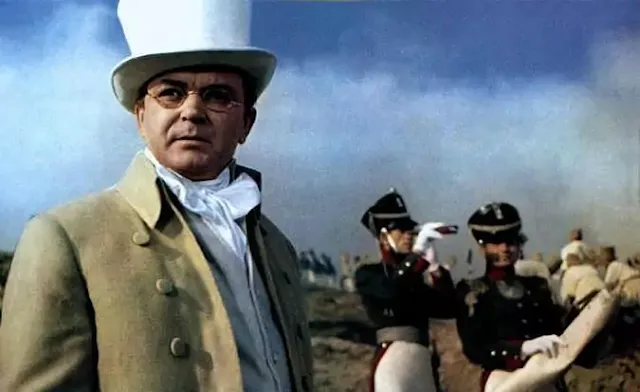 |
| Pierre Bezukhov |
1. Two very different lonely people
Like "Anna Karenina", "War and Peace" is also a two-line parallel story structure, with Pierre Bezukhov and Andre Paulkansky as the protagonists, telling the story of Paul The four aristocratic families of Erkansky, Bezukhov, Rostov, and Kulakin experienced the ups and downs from 1805 to 1812.
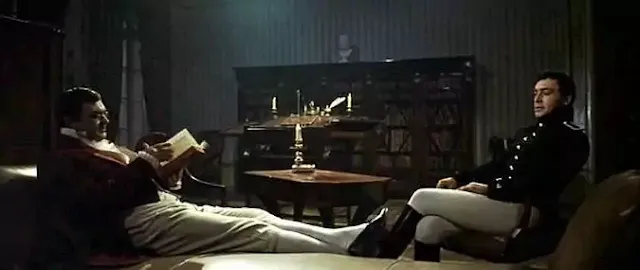 |
| Pierre and Andre |
Pierre was born burly and fat, intelligent and sharp-minded, but because of his over-kindness and frankness, he seemed a bit clumsy and silly and easy to manipulate.
When he was still the illegitimate son of Count Bezukhov, he was marginalized; when he inherited a huge amount of property and title, he became the darling of the social world. He is generous by nature, he is not surprised, and he doesn't care about it at all.
Andre is not tall, handsome in appearance, indifferent and arrogant, deep and knowledgeable, and bored and bored with the entertainment that the upper class loves.
His father used to be a Russian field marshal and has always placed strict demands on him. Whether in the military or in politics, his future is bright.
As a brave and fearless soldier, he has repeatedly invited Ying to serve in the most intense battles.
At first glance, they have nothing in common. However, Pierre and André have always regarded each other as best friends.
As people who are incompatible with mainstream social values, they have one essential thing in common-they want to pursue spiritual peace and find the answer to the mystery of life and death.
This is not only the beautiful vision that Tolstoy expressed in many works but also the ultimate goal he himself strives for in reality throughout his life.
2. The disillusionment of heroic fantasy
After becoming the heir of the Bezukhov family, Pierre suddenly became the hottest unmarried wife in Moscow, and the wives and gentlemen were planning to marry their daughters to him.
In the end, Duke Vassily Kulagin used a trick to make Pierre confusedly marry his daughter Helen.
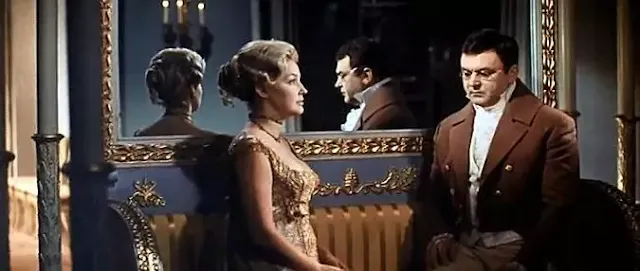 |
| Pierre and Helen |
Unlike the married life Pierre envisioned, the well-known Helen was uneasy in the room, and often rumored with people, including his gracious friend Taurokhov.
After receiving the informant's letter, Pierre had to believe that his wife was cheating under his nose.
Unbearable Pierre separated from his wife and launched a duel with Taurokhov. He didn't even know how to fire the gun, so he was lucky enough to hit the opponent, and then he was overwhelmed by his kind nature, full of guilt that hurt his life.
For Pierre, a chicken feather in life can barely endure, and letting the idol of worship fall from the altar is a disaster.
As a young student studying abroad who recently returned to China, Pierre highly respected the famous Napoleon.
In the sensitive period before the war with France in 1805, Pierre took the world’s bad faith and publicly defended Napoleon on social occasions, claiming that Napoleon’s execution of his political opponents as a duke was out of national needs, and he was not afraid to deal with it alone. Taking responsibility is what makes him great.
 |
| Napoleon on the battlefield |
In Pierre's mind, he not only regarded Napoleon as the only person who knew about revolution but also regarded him as a person who transcended the revolution, because he stopped the excessive behavior in the revolution and kept all the good things, such as equality of civil rights and publication of speech.
Freedom and so on. He is also committed to safeguarding human rights and eliminating prejudice. In short, he is an unprecedentedly great leader.
In 1812, Napoleon led an army to go deep into the heart of Russia for two thousand versts. Pierre participated in the tragic battle of Borodino and witnessed the heinous crimes of the French army in the Burning City after the fall of Moscow. Napoleon's heroic fantasy was completely shattered.
In confusion and suffering, Pierre made up his mind to assassinate Napoleon. He concealed his identity, changed into a peasant's costume, and carried a dagger, ready to do it when Napoleon entered Moscow.
From Pierre's point of view, Napoleon changed from a great leader to a bastard villain, and he himself changed from a supporter of Napoleon to an assassin. It cannot be said that it was a great change in faith that was shaking.
However, when you think about it carefully, it happened to fall into the historical view of heroism criticized by Tolstoy—the former regarded Napoleon as the "great leader", and he attributed all the achievements of historical events to Napoleon; later, he regarded Napoleon as "Asshole villain", he blamed all the crimes of historical events on Napoleon, there is no essential difference between the two.
3. Thinking about life and death
When Pierre publicly defended Napoleon before, André was also there. He took the initiative to relieve Pierre who had attacked the group.
He believed that with regard to the actions of politicians, it should be distinguished which belonged to private actions and which belonged to the commander-in-chief or the emperor. Behavior should not be generalized.
Obviously, Andre did have some admiration for the distinguished Napoleon, and he also showed this in his later conversations with his father.
When the Battle of Austerlitz broke out in 1805, the French defeated the Russian-Austrian forces. Andrei was originally an adjutant to Commander-in-Chief Kutuzov, so he didn't have to participate in the fight.
However, when he saw the flag bearer's death, the flag that symbolized the dignity of the army fell to the ground, he bravely carried the flag and called on the defeated and defective soldiers to return to the battlefield. At this moment, the sharp blade of the French army stabbed him.
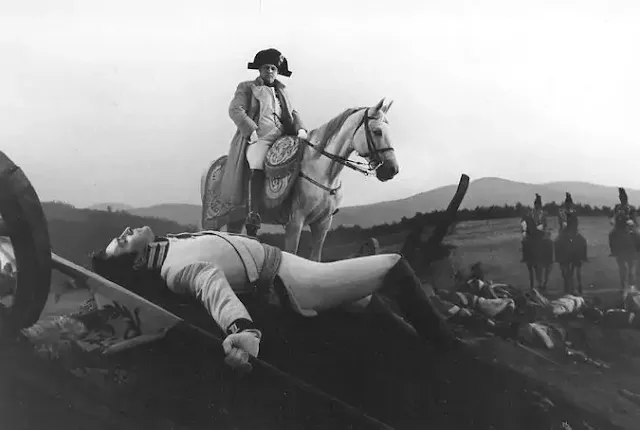 |
| Napoleon saw Andre holding a military flag |
After the battle, Napoleon patrolled the battlefield and saw Andre, praised his heroic behavior, and asked him to be treated.
At this time, Andre, who was lying on the ground, looked up at Austerlitz, the benevolent sky, and his heart suddenly became clear, and he realized that everything that Napoleon cared about was so insignificant.
The hero he once had in mind, the vulgar vanity he had, and the joy of victory were so small. Andre concluded:
"Greatness is actually worthless, life is worthless, and death is worthless."
When Andre returned home after being healed from his injury, life, and death were presented in a more dramatic way: his wife died of dystocia, and his son was born.
After several years of a solitary life, the 31-year-old André returned to the social world with Pierre's encouragement. At the time when the second daughter of the Rostov family, Natasha turned 15, participated in the dance for the first time.
Due to the fall of the family and unable to produce a decent dowry, Natasha did not receive any invitations to dance. Pierre, who had always been full of special tenderness for Natasha, asked André to invite her to dance because he was not confident about his appearance.
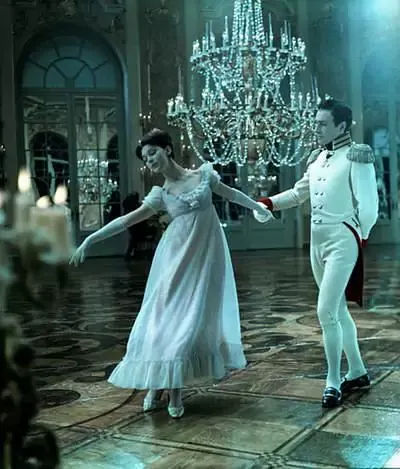 |
| Andre and Natasha |
Andre and Natasha fell in love and asked her to marry him. Due to Andre’s father’s opposition, the wedding date was set one year later. Andre just happened to have an old injury and went abroad to recuperate.
He agreed to get married in one year. During this period, when Natasha received a cold reception from André’s father and sister and felt humiliated, she was lured by Pierre’s brother-in-law Anatoli which almost caused an elopement scandal. The Skies wrote a letter to dissolve the marriage contract.
After returning to China, Andrei was full of grief and anger. Although he knew that Natasha was extremely remorseful, he broke the marriage contract with her out of arrogant self-esteem. For Anatoli, who abducted his fiancée, Andre vowed to kill him if he saw him again.
4. Andre’s answer
In August 1812, the Russian and French armies broke out a tragic battle in the village of Borodino, 125 kilometers outside Moscow. Both sides suffered heavy losses. The French army suffered nearly 30,000 casualties and the Russian army suffered about 40,000 casualties.
The direct result was that the Russian army abandoned Moscow and was occupied by the French army. On the surface, it seems that the French army won, but the magic is that from this battle, the Russian army gradually grasped the initiative of the war, and the French army's defeat began.
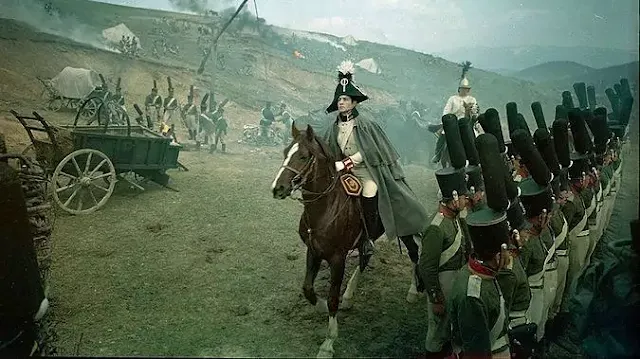 |
| Andre on the battlefield |
The army led by Andre also participated in this battle. As before, he did not take advantage of the friendship between Commander-in-Chief Kutuzov and his father. He did not want to stay in the safe command and general staff.
Instead, he applied to go to the place where the fighting was the fiercest and was calm and calm in the midst of gunfire.
Until a shotgun fell by his side and was once again engulfed by the shadow of death, Andre suddenly penetrated the question of life and death, and his heart was filled with love from the depths of his soul.
This kind of love that doesn't even need a specific object gives him peace and happiness that he has never had before.
After Andrea was seriously injured in the abdomen, he was taken to the rescue station and found that the person lying next to him was Anatoli. The doctor was sawing off one of his injured legs, and the handsome face that had fascinated countless ladies and girls was distorted in severe pain.
Looking at the enemy he swore to kill, Andre didn't have any pleasure, only endless compassion, and even shed tears of sympathy for him.
After finally saving his life, Andrei was transferred to the evacuated team from Moscow. There, he was surprised to meet Natasha. She was so ashamed and desperately begged Andre to forgive her, so there was such a very moving dialogue:
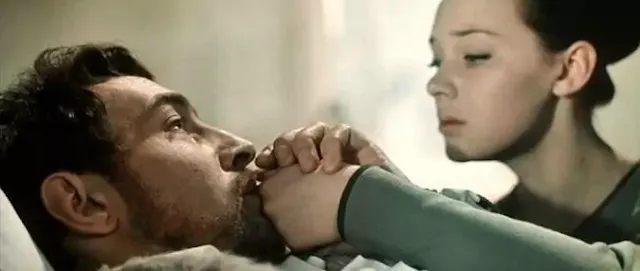 |
| Andre and Natasha |
"It's you? I'm so happy!"
"Forgive me! Please forgive me!"
"I love you."
"forgive me……"
"Forgive me?"
"Forgive what I did...thing."
"I love you more than before."
After suffering the baptism of death, Andre's love for her was completely awakened. He used to love her to be charming and lively, love her to be innocent and lovely, but now he can deeply understand her pain and regret, and understand the cruelty that his dismissal brings to her. This kind of deeper love has extraordinary redemptive significance for both of them.
While he was dying, the spirit of love that Andre had understood enabled him to completely eliminate the gap between life and death, and even gradually abandon the world, because death is not terrible.
He loves not only his lover, but also his enemy, and often misses Anatoli's safety. In the end, he and Anatoly became part of Borodino's list of deaths.
5. Pierre's rebirth
After the fall of Moscow, most of the nobles in the city had already packed their bags and quickly evacuated with valuables. Pierre, regardless of his huge family business, regarded wealth as a passing moment, and he himself planned to spare his life and kill the heinous Napoleon.
In the burning city fire in Moscow, Pierre risked his life and rushed into the fire to rescue the trapped children; then, in order to protect a Russian girl, he fought against a few unruly French soldiers. Later, outnumbered, he was framed as an arsonist and arrested in a prisoner-of-war camp.
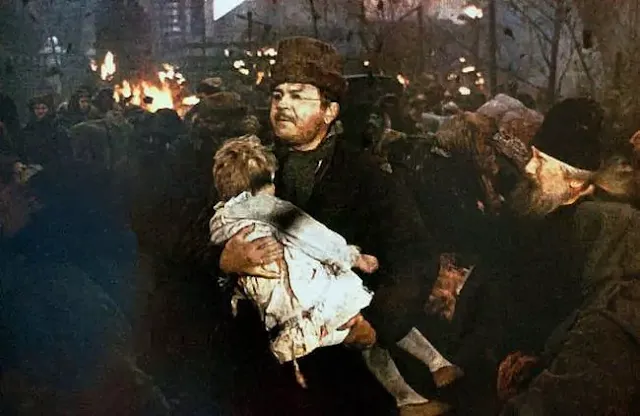 |
| Pierre saves the child |
At this time, his goodness of the world, human conscience, and faith in God were all shattered.
In a prisoner-of-war camp, he met Platon, a soldier who was ill and captured. Pierre was surprised by his optimistic attitude. In such harsh conditions, he treats anyone he meets with enthusiasm and kindness and even raises a stray dog with food that is already scarce. He found that Pierre was too hungry, so he generously distributed the potatoes to him.
Pierre was about to devour it. Platon stopped him, then cut the potatoes in half with a knife, and carefully sprinkled them with salt, saying that it was delicious to eat like this. This feeling is quite strange: a pampered noble master, taught by a farmer how to eat elegantly.
 |
| Platon in a prisoner-of-war camp |
Pierre was greatly shocked by this incident, and he began to reflect on whether he had treated a potato with Platon’s cautious attitude, and even his own life when his conditions were 10,000 times more favorable. ?
During the month-long relationship, Pierre gained from Platon’s simple wisdom, a major inspiration that he had never received from the difficult books and the teachers of Freemasonry.
When the French army retreated, Pierre and the other prisoners of war were forced to follow the march in the severe cold, leaving only a dead end for those who were left behind.
Seeing Platon being shot, he was also in a dangerous situation of unknown life and death. Later, he was rescued by a group of Russian guerrillas. When he returned to the formerly rich and safe environment, he was reborn physically and mentally.
6. True heroism
After the Russian army withdrew from Moscow in September 1812, it launched a mobile war nearby, blocking the French army’s way to the south, threatening the enemy from the side, cutting off its connection with the rear, and at the same time replenishing the army to prepare for a counterattack.
What is more valuable is that in the enemy-occupied areas, the Russian people have extensively carried out guerrilla warfare.
The French army was in a situation where it had run out of ammunition and food. As the severe winter approached, Napoleon tried to go south to find food and a warm shelter and was forced to abandon Moscow on October 19, ending a month-long frenzied plunder.
On the way to retreat, the Russian army and the guerrillas pursued victories, and finally, at the end of December, Napoleon fled back to Paris with 30,000 remnants.
So, where does Tolstoy's influence on the course of history come from?
Hunger from the cold? No, as long as it is distributed reasonably and not looted at will, in Moscow you can get clothes for the whole army for the winter, as well as food and grass for the army for half a year.
The wise leadership of the Russian commander-in-chief Kutuzov? No, no matter whether he stayed alone or retreated to retain his strength, most of his decisions were reprimanded and opposed by Tsar Alexander, let alone the power struggle headed by Chief of Staff Benison.
Mistakes from Napoleon? No, his behavior during this period was not inferior to what he did in Egypt, Italy, Austria, and Prussia. From entering Moscow to exiting Moscow, he issued orders one after another. From military, judicial, diplomatic, and administrative aspects, there were no loopholes in his decision-making.
Obviously, this powerful force can surpass historical puppets such as emperors and commanders. And when you finish reading the book "War and Peace", you will understand in detail or slightly the deeds of more than 500 characters in the book:
This force comes from countless nobles like Pierre, who used a large amount of fortune to recruit and organize militias to encourage domestic slaves to join the army to gain freedom; from countless officers like André, who stay away from the privileged life, Fighting bravely for the motherland without hesitating to sacrifice their precious lives; also from countless women like Natasha, who care about the suffering of the soldiers and serve them as much as they can, preferring to abandon their belongings and vacate the carriage to remove their injuries. Soldiers...
Of course, this force comes from thousands of unknown and unnamed Russian people who either joined the army or formed guerrillas to implement the combat policy of "strengthening the walls and clearing the country" to beat the invaders on the land where they were farming and working.
This great force that can pull the emperor off the horse is morale and even more popular support.
In Tolstoy's view, compared to the so-called "heroes" who are well-known in history, the power of these ordinary people to change the course of history is more able to demonstrate simple heroism, "War and Peace" It is such a magnificent anthem of heroism.




